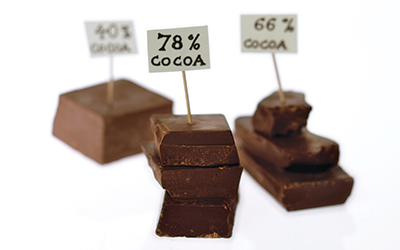Long touted as a sinful indulgence, a guilty pleasure, and a nutritional taboo, chocolate has gotten a bad rap. It has been eschewed by waistline watchers and shunned by dogmatic dieters. Now really, how could something so rich and luscious and satisfying be good for you? Aren’t I supposed to feel guilty after I delight in this ambrosia? Well, the evidence is in and if you haven’t heard, dark chocolate has many health benefits.
Give Due
The latest findings are that chocolate makes blood vessels more flexible, adding to the already mounting evidence that chocolate may be good for the heart. According to Penny Kris-Etherton, Ph.D., a registered dietitian at Pennsylvania State University, “New and yet-to-be-published studies are showing that antioxidants in chocolate––dark chocolate and cocoa powder––may increase ‘good’ (HDL) cholesterol levels by as much as 10 percent.” Furthermore, one of the fats in chocolate, stearic acid, can also boost HDL levels.
Prior studies had shown that chocolate contains polyphenols, the same type of antioxidants found in green tea and red wine, and flavonoids that hinder blood clotting and reduce the threat of coronary artery blockages. Flavonoids are also thought to fight the cell-damaging effects of oxidation. Oxidation causes the formation of free radicals, or unstable molecules, that are the prime causes of diseases such as obesity, diabetes, cancer, heart disease, and immune system suppression.
If this isn’t enough to ward off guilt, dark chocolate contains cocoa phenols, compounds known to lower blood pressure. According to Daniel DeNoon, medical journalist, “Chocolates made in Europe are generally richer in cocoa phenols than those made in the U.S. So if you’re going to try this at home, remember, darker is better.”
And yes, there is a reason why we reach for the dark stuff when we’re down. Chocolate helps boost serotonin, a neurotransmitter that acts as an antidepressant. Consumption of chocolate also triggers the release of endorphins, feel-good molecules that give us the happy rush, explaining that warm inner glow induced in susceptible chocoholics.
Be Fair
Revelations in recent years have shed light on the other “dark” side of chocolate. Sadly, much of the chocolate sold in the U.S. comes from African cocoa farms using slave labor – often child slaves – in cruel, unsafe, and potentially deadly working conditions.
Unfortunately, there is not a universal definition of “fair trade,” and organizations offering such certification can have varying standards and levels of oversight. According to Alisa Rutherford-Fortinati, author of Fair Trade Chocolate: A Myth?, “Because of the difficulty in policing farming practices, items marked as ‘fair trade’ may still contain cocoa that was produced using slave and child labor or under unsafe working conditions with inadequate or no pay.”
Buying organic is one way to lessen the risk that your chocolate was sourced from unethical farms or middlemen. Most organic chocolate is grown in Central and South America, where slavery has not been as great a concern. Because organic chocolate is not as prevalent, most of those farmers receive a fair price for their beans.
Do your research. Check into the companies claiming to offer fair trade chocolate and ask what steps they are taking to ensure their cacao is, in fact, “fair.”
Hold the Milk
Notice that there is no mention of milk chocolate here? Or white chocolate? Milk and white chocolate have a much lower cocoa content than dark chocolate and it’s the cocoa that packs the health-giving punch. Also, the added milk solids and sugar can kill the taste, purity, and aroma of the cocoa, often rendering milk chocolate less flavorful, healthy, and satisfying than its dark counterpart.
Dark chocolate can either be sweet, semi-sweet, bittersweet, or unsweetened and may contain up to 12% milk. Your ideal chocolate indulgence would contain at least 70% cocoa, unlike milk chocolate’s mere 10-20%. Look for high-quality chocolate that’s glossy and breaks cleanly.
A Dab’ll Do Ya
Good quality dark chocolate is so richly delicious that a single piece can be a satisfying snack or after dinner treat. There’s nothing wrong with having an ounce a few times a week. So go ahead and enjoy, no guilt necessary.
Jill Grunewald is a Minneapolis-based holistic nutrition coach and health and wellness writer.

This Post Has 0 Comments